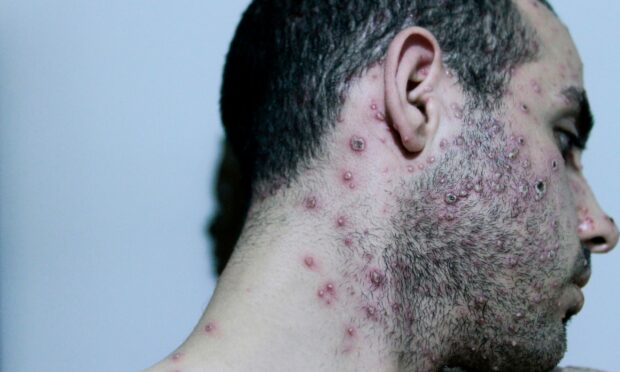The first case of monkeypox has been confirmed in Scotland.
Public Health Scotland say the individual with the virus is being treated and contact tracing is under way.
It has also been confirmed they have not travelled abroad recently.
There are now 56 confirmed cases of monkeypox across the UK, but this is the first in Scotland.
It has not been confirmed where in the country this case is.
Dr Nick Phin, director of public health science and medical director at PHS said the overall risk to the public remains low.
He added: “We have well established and robust infection control procedures for dealing with such cases of infectious disease and these will be strictly followed.
“We are working with NHS boards and wider partners in Scotland and the UK to investigate the source of this infection.
“Close contacts of the case are being identified and provided with health information and advice. This may include the offer of vaccination.”
Smallpox vaccines stockpiled
In light of the first case being confirmed in Scotland, a “small number” of smallpox vaccine shots have been stockpiled in Scotland.
They are understood to be about 85% effective against monkeypox.
Dr Phin added: “We’ve ordered more than sufficient for the current case and this should give us a buffer should we get any cases in the next day or two.”
He added that the vaccines had been sent to Glasgow and Edinburgh and that the cases in the UK should not be treated as “Covid two”.
“I don’t think this is Covid two, in fact, I’m sure this is not Covid two,” he said.
“There are a number of striking differences between this and Covid. We’ve got a longer incubation period. We’ve got an effective vaccine and we’ve got effective medication.
“There is not what we understand to be an asymptomatic phase so in other words, if you’ve got symptoms, that’s when you’re infectious.”
What are the main symptoms?
The rare infection is predominantly spread by wild animals such as Gambian pouched rats and different species of monkeys in central and west Africa.
Common symptoms of monkeypox include high temperature, headaches, muscle aches, backache, swollen lymph nodes, chills and exhaustion.
A blister-like rash or small number of blister-like sores can develop, often beginning on the face, then spreading to other parts of the body.
The virus can occasionally be mistaken for chickenpox.
Anyone displaying these symptoms should avoid close contact with others and seek medical advice.

Conversation